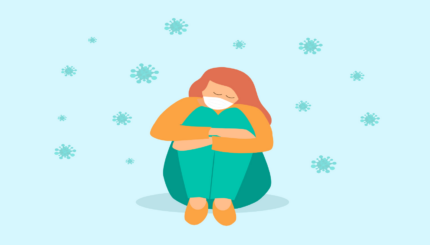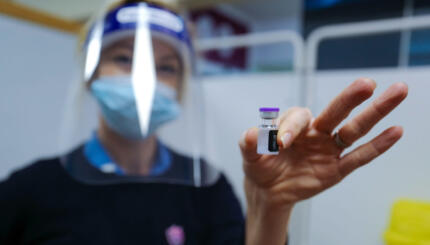A family friend of ours died this summer, from COVID-19 complications. I was the officiating rabbi at his burial. No Tahara, ritual washing of his body, had been permitted. We, a small group of twelve, gathered at the graveside. Each of us wore a mask and disposable gloves. We stood six feet apart. After the burial, the immediate family gathered alone at home for a meal.
My heart goes out to this family. This was a cold sendoff. Exactly the opposite of the hands-on, community-supported rituals they, as Jews, had come to know.
But they did not object. They did not push against any rule. And I’ve wondered why.
First, I think, they know how contagious the virus is. Two of the five mourners had also been ill with COVID-19. They had survived but their loved one had not.
Second, they love their community. Maybe it sounds paradoxical because the community couldn’t show up for them. But they took a longer-term view. The burial, the shiva, were important moments. But they were just moments, perched between a past and a future. And they wanted the community to have a healthy future.
Third, they practiced self-discipline. I’m sure this was not easy. It’s hard to hold a confusing mix of emotions. And they felt sad, relieved, guilty, resigned, angry, and grateful all at once.
These practices––love of community, and self-discipline––are really important in COVID-19 time. If we want to change our public health habits, says Canadian anthropologist Wade Davis, we need both. An empathic love of community to motivate us. And self-discipline to restrain us.
When I read Davis’s essay, I thought about the high holidays. It’s our time of teshuvah: repentance, return, repair. There’s the immediate teshuvah of apology and restitution. And also the long, slow teshuvah of change. Long-term teshuvah invites us to review our values and feelings.
Do we care about our spiritual community, neighborhood, city? Are we aware of how we affect others? If so, how do we show it?
Do we have emotional self-discipline? Can we notice our feelings as they arise? Redirect or restrain them if needed?
Would our answers still be “yes” if we were tested as my grieving friends were?
What if we, too, had a life cycle event filled with emotion? And we had to celebrate it in a synagogue filled with rules? Based on public health guidelines, but developed by volunteers? No hugging. Only 49 people can attend your child’s bat mitzvah. Your chuppah (wedding canopy) must more than six feet wide, so the rabbi can safely distance. The chaplain can visit your home, but you must wear a mask.
Would we impulsively hug all guests? Invite 52 people to the bat mitzvah, because “a few extra can’t hurt”? Insist on using grandma’s precious but tiny quilt as a wedding canopy? Greet the chaplain without a mask, because “it’s just the two of us”? Call around the city for a more flexible teacher, rabbi, or chaplain?
In fact, that’s exactly what many of us do. (And I confess to being part of that “us.”) Why do we do this?
We do care about community, but we define it too narrowly. We want the best for our family and guests. But we forget that our rabbis and chaplains also help many other people. And whatever virus we shed travels with them to the next person.
Also, we forget to use our emotional self-discipline. Excitement and desire carry us away before we can redirect or restrain them. So, we hand our feelings over to the synagogue staff. We hope that they will do the emotional work for us. Hold our feelings. Set our boundaries. Remember the big picture.
At the best of times, emotional work is tiring. In COVID time, it is exhausting. Especially for clergy and synagogue staff. They work overtime carrying our emotions so that they can keep the vulnerable safe.
Maybe, this year, our teshuvah can work towards community care and emotional self-discipline. With these attributes, we can support our spiritual leaders. And, as Wade Davis says, support one another in reaching towards health.
***
Bibliography: Wade Davis, “The Unravelling of America,” Rolling Stone, August 6, 2020.
This post researched and prepared as part of an interdisciplinary grant studying “Distant Prayers? COVID-19, Religion and Conflict,” Peter Wall Institute for Advanced Studies, University of British Columbia.



